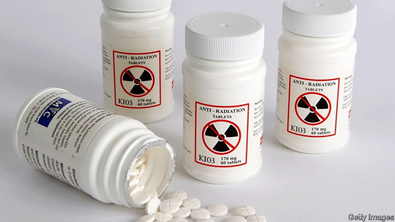Anti-Radiation Pills
Context
Recently, with fears of a nuclear disaster at Ukraine’s Zaporizhzhia power plant growing, the European Union has decided to pre-emptively supply 5.5 million anti-radiation pills to be distributed among residents in the vicinity. 
What is a Radiation Emergency?
- Radio-nuclear hazard: These are unplanned or accidental events that create radio-nuclear hazard to humans and the environment.
- Such situations involve radiation exposure from a radioactive source and require prompt intervention to mitigate the threat.
- Dealing with such an emergency also involves the use of anti-radiation tablets.
What are Anti-radiation Pills?
- Potassium iodide (KI) tablets or anti-radiation pills are known to provide some protection in cases of radiation exposure.
- They contain non-radioactive iodine and can help block absorption and subsequent concentration of radioactive iodine in the thyroid gland.
- The thyroid gland, which uses iodine to produce hormones to regulate the body’s metabolism, has no way of telling radioactive from non-radioactive iodine.
- Potassium iodide (KI) tablets rely on this to achieve ‘thyroid blocking’.
What’s the risk?
- Contamination: After a radiation leak, radioactive iodine floats through the air and then contaminates food, water and soil.
- Inhalation: While radioactive iodine deposited during external exposure can be removed using warm water and soap, the bigger risk is inhaling it.
- Internal exposure or irradiation occurs when radioactive iodine enters the body and accumulates in the thyroid gland.
- The thyroid gland which uses iodine to produce hormones to regulate the body’s metabolism has no way of telling radioactive from non-radioactive iodine.
How do these pills work?
- Thyroid blocking: Potassium iodide (KI) tablets rely on this to achieve ‘thyroid blocking’.
- KI pills taken a few hours before or soon after radiation exposure ensure that non-radioactive iodine in the medicine is absorbed quickly to make the thyroid full.
- Because KI contains so much non-radioactive iodine, the thyroid becomes full and cannot absorb any more iodine either stable or radioactive for the next 24 hours.
Risk associated
- Thyroid cancer: But KI pills are preventive only and cannot reverse any damage done by radiation to the thyroid gland.
- Once thyroid gland absorbs radioactive iodine, those exposed are at a high risk of developing thyroid cancer.
About Zaporizhzhia Nuclear Power Plant
About International Atomic Energy Agency
|

